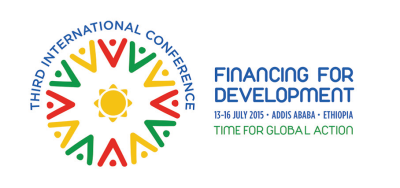Addis Ababa, Ethiopia – While the mobilising of donor finance is one side of the development coin, the effective, efficient and accountable use of development funds is the other. This was the theme for a side event held on 15 July on the occasion of the 3rd Financing for Development Conference that took place in Addis Ababa last week.
At the event Kimi Makwetu, chair of INTOSAI’s Capacity Building Committee, on behalf of the INTOSAI donor cooperation partners, joined a panel of public finance management (PFM) reform practitioners from government and international organisations to share insights on how to assess PFM performance, achieve improvements, and monitor progress towards desired goals.
While the overall emphasis was on improving public expenditure efficiency, effectiveness and accountability, the CBC Chair highlighted the role of independent public sector auditors in providing assurance and strengthening accountability in the use of public resources. He explained how independent external public sector audits positively impact on good governance and public trust; how SAI reports enable parliaments, governments, citizens and development organisations to take informed decisions, and reminded the audience that the United Nations and various global bodies had acknowledged the indispensable role of SAIs in promoting the efficiency, accountability, effectiveness and transparency of public administration. He placed particular emphasis on the fact that SAIs can accomplish their tasks objectively and effectively only if they are independent of the audited entity, are protected against outside influence, and are adequately resourced.
The CBC Chair also explained that while financial, compliance and performance audits provided a solid base for PFM, environmental and performance audits are valuable tools for SAIs to contribute to the auditing of sustainable development goals. In order to ensure professionalism across the globe, INTOSAI develops and maintains professional SAI standards, builds SAI capacity to apply standards, ensures knowledge exchange, and promotes SAI responsiveness and continuous improvement. Adherence to international standards strengthens SAIs as credible sources of objective insight supporting PFM. The CBC Chair pointed out, however, that it was expensive to develop, implement and verify the success of the implementation of standards and that support from governments and donor partners had been indispensable and greatly appreciated. The 2014 IDI global SAI stocktaking report indicated that the performance of SAIs in developing countries was improving overall, but that considerable challenges remain, in particular in respect of SAI independence and the timeous publication of audit reports. Continued and strengthened SAI donor cooperation will therefore be essential to further improve the performance of SAIs.
As global recognition of the central role of SAIs within good governance and public finance management systems increases, it is incumbent on all SAIs to undertake measures that will demonstrate the value and benefits of independent and capable SAIs and their positive impact on PFM and the contribution of SAIs to the efficient, effective, transparent and accountable implementation of the post-2015 development agenda and the sustainable development goals.
Written by Cobus Botes,
Office of the Auditor-General of South Africa

